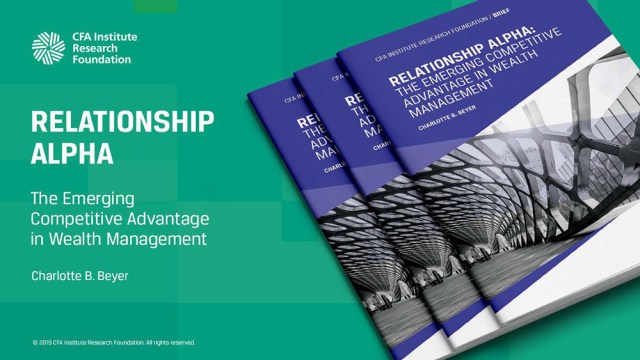[ad_1]
Years of research show female investors outperform men, Blair duQuesnay, CFA, observed in her January 2019 New York Times opinion piece. Yet only about one in five brokers are women. duQuesnay acknowledged that while gendering any ability or trait can make people uncomfortable these days, there is ample evidence to support the idea that women might be better equipped to “help families nurture and protect their nest egg.”
She provided her candid perspective on the flaws in the persistently male-dominated finance industry and suggested that the implications of the gender gap included, potentially, “a financial blow to millions of households.” She continued:
“Whatever the paths taken, the future of finance should be female. It wouldn’t just be more fair. If the years of data are any indication, it’s a future in which all of us would make more money. Find me a good argument against that.”
Not just a pretty title, “Consider Firing Your Male Broker” sure made waves in the finance community.
Last month, Blair invited me to join her in discussion on her IGTV show “This Week in Women Live” and to share my current research. She asked me about the women and finance trends I’m seeing these days. In reflecting on her question, I quickly realized that my top five findings would lend additional support to her thesis from nearly three years ago. Now that would make for an interesting discussion!
duQuesnay also agreed to co-author this article. Her comments can be found in bold below each of mine.
Women and Finance: Today’s Five Hot Topics
What are women investors asking their investment advisers as we emerge from the global pandemic? What issues are top of mind for women and their money?
I am always trying to track trends in this space by conducting confidential interview-driven global research. In spring 2020 I set up The Rich Thinking® Financial Advice Hotline: a free 30 minute confidential Zoom chat offering an independent, unbiased perspective on a woman’s financial situation with no sales pitch. In exchange, I received permission to use the anonymized data that comes from these conversations to make my research even better. I’ve now had nearly 100 Zoom calls. To further corroborate my findings, I am also reaching out to top global investment advisers for the current investor mindset.
1. Job Loss / Career Shift
This issue often comes up on my calls with women. Perhaps it relates to the fact that a significantly higher percentage of women have either lost their jobs or a big chunk of their employment income during the pandemic. Women of all ages are looking for new and creative ways to support themselves and their families and we are seeing a surge in the number of female entrepreneurs post-COVID. According to some early indicators, women are starting three-quarters of new businesses. I call this “The COVID Catapult.”
I spoke with Jacqueline Ruedin Rüsch, founder and CEO of Privilège Management in Zurich, and she agreed that one of the main concerns for her female clients has been potentially losing their jobs. “In general, this pandemic increased the level of fear and uncertainty,” she said. “So women have had a need to talk more, understand more, and be listened to more. My job is to listen to women and try and understand their needs.”
Wouldn’t a woman be better suited to listen to another woman about her deep fears and uncertainty and the implications on her financial life?
Blair duQuesnay, CFA: I believe women feel more comfortable sharing personal information with other women. Many times a client, or a potential client, remarked they never expected to discuss nonfinancial troubles with their financial adviser. Money often intersects with important career, relationship, and health care decisions. I have had countless, hour-long conversations with clients where we never even discussed the portfolio.
The COVID recession has famously been called a SHE-cession because of its disparate impact on women. The initial shutdowns involved sectors of the global economy where a higher percentage of the jobs were held by women, such as leisure, hospitality, and education. As school closures persisted, and many schools remained virtual into the following academic year, many women made the difficult decision to leave the workforce to cover unmet childcare needs. In the United States, as many as 1.8 million fewer women are participating in the workforce today than before the pandemic.
Women who were able to maintain their jobs throughout the pandemic began to question their future careers. Remote work has made living near a physical office obsolete in many cases, and I’ve seen moves to new cities, states, and even countries. These are major financial decisions that a good financial planner can help quantify. It may be easier to share your dreams of launching a spa out of an Airstream trailer in Albuquerque with a woman than with the stereotypical male adviser.
2. Relationship Changes
As I suggested in “Suddenly Single: How to Plan with Female Clients,” planning to be single might not be a fun conversation, but it is arguably a very important one given that 90% of married women will end up needing to manage their own finances at some point due to divorce or widowhood. This trend has only been exacerbated by the pandemic.
A recent CBC News article “Broken Marriages Becoming Pandemic’s Other Toll” quoted financial literacy and credit counsellor Pamela George: “Pre-COVID, I would work with couples to help them figure out their finances together,” said George. “Now, 80 per cent of my clientele are women who are looking to leave a troubled marriage, or women who have just left and need help to figure out their finances.”
Wouldn’t a woman prefer to have this type of discussion with a female adviser?
Blair duQuesnay, CFA: I was surprised to read that the divorce rate declined in the United States during COVID, but I later found out it was because the courts were closed. Forced quarantine shone a light on the problems in many relationships, and we are witnessing a wave of post-pandemic divorces. I have always beaten the drum on the importance of women understanding their money situation and claiming independence. The statistic that 90% of women will at some point end up making financial decisions alone is incredible. There is no better time than today for women to focus on their finances.
We know that 80% of widows search for a different adviser after the death of a spouse. The husband’s adviser often does not listen to their concerns, is condescending in his answers, and uses confusing jargon. How many times have I heard the story of the male adviser who never makes eye contact with the woman during a meeting with both spouses? It is a cringe-worthy story but one that is too often repeated.
I imagine that women who find themselves suddenly single would prefer working with a female adviser. Women are shown to be better listeners, to have more empathy, and to be better at explaining financial concepts in simple, plain language.
3. Rise in Online Investing for Women
One of the questions I get asked most often is “Where can I find a community of like-minded women investors?” I’ve come across lots of different investing platforms around the world and they’ve been an incredible inspiration to many. I’m excited that women are signing up to investment platforms at faster rates than men. According to the Financial Times, “The lockdown period has reduced spending, increased savings and expanded the amount of time women have to think about financial planning.”
Some women find that doing their own online investing is a great way to improve their dialogue with their adviser. Susan Knowling is a retiree in Canada who was curious about how stock markets work. Her female professional adviser suggested that she open a small online trading account. Knowling explained how this has helped her:
“Being a cautious person, I started with a modest sum during a market slump and for months hung on every fluctuation of the economy and the stock market, often selling what I should have kept. I’m more relaxed now and I have learned to trust my initial judgment. Panic is not an emotion that will make money or safeguard future income. The knowledge necessary to build a financial portfolio is considerable. I now have a greater understanding and respect for the job done by my adviser. My new knowledge hasn’t changed my approach to investing but I am clearer on some of the issues.”
If you are trading online or if you belong to an online woman’s investment community, wouldn’t you rather share your learnings with a female adviser? Or does belonging to an online community of women replace the need for a female adviser? Blair, how do you think those possibly-contrary effects work?
Blair duQuesnay, CFA: I am very excited about the rise of online investing advice. There is a shortage of financial advisers, and many advisers have set minimums to engage their services. I’ve spoken to several local investment clubs for women throughout my career, so these online communities are merely extensions of what women are already doing offline.
And why not seek advice from other women? Study after study suggests that women are better investors than men. The latest study from MIT found that men are more likely than women to panic sell during steep market declines.
I do not view online advice as a competitor to in-person advice. The same investor will likely use both at different points of her life. I applaud online advice and community forums created specifically for women. Women deserve advice tailored to their needs. After all, we earn less and live longer than men, making investing success even more critical to a woman’s financial plan.
4. Legacy: What Is Meaningful?
A survey of 1,000 US adults conducted by Parade magazine and Cleveland Clinic in June 2020 found that as a result of the pandemic most people have gained new perspective on what really matters. Sixty-five percent said the pandemic has made them re-evaluate how they spend their time and 58% said it’s made them re-evaluate their life goals. This idea of “what is meaningful?” comes up a lot in my conversations with women — young and old.
Maria Pia Leon, director of Forbes Family Trust in Miami, shares her perspective:
“The pandemic has reminded us of our human condition. The dialogues I am having with families are more philosophical, about their mortality and their legacy. They are thinking about what they are going to leave to their loved ones, not only money but also what their contribution will be to their family and society. This is far more complex than discussing investments, this is an emotional and energy-consuming challenge. My answer is that a real legacy is a bond through generations based on a shared purpose, which must be worked out by the family. I remind them that the lack of a legacy plan, shared purpose, and wealth education, combined with disputes among generations is a dynamic that blocks the success of a family and the family business.”
According to extensive 2016 research by Korn Ferry, women score higher than men on nearly all emotional intelligence competencies. Wouldn’t it make sense that a female adviser would be better equipped to have these more emotional types of discussions that involve defining shared purpose and legacy?
Blair duQuesnay, CFA: The pandemic was a dramatic pause to life as we knew it. I attended a virtual women’s summit hosted by JP Morgan Asset Management last spring, and the keynote speaker was Oprah Winfrey. Oprah referenced the writings of Eckhart Tolle who said, “Life will give you whatever experience is most helpful for the evolution of your consciousness. How do you know this is the experience you need? Because this is the experience you are having at the moment.”
Oprah suggested that the entire planet was experiencing a forced moment of self-reflection, and that it was the one we all needed. This concept touched me and helped me to understand the dramatic changes I saw women — friends, family, clients, and colleagues — make during the pandemic.
There is a certain level of wealth at which the conversation with an adviser becomes less about having enough and more about what it’s all for. This is not an easy question to ask, nor is it simple to answer. But in that uncomfortable space lies the most important aspect of how I can bring value to clients. Can a male adviser do this? Of course. But women seem to be naturally suited with certain skills to have these deep and meaningful conversations.
5. Impact and Environmental, Social, and Governance (ESG) Investing
As pointed out in “Corporate Sustainability: Three Reasons Why It’s Even Better Than You Think,” investors are doing well by doing good: “As of 2020, ESG mutual funds hit $1.7 trillion, up 50% year over year, while firms committing to integrate ESG into their investing managed a collective $100 trillion.”
My global research has consistently shown that women were more likely to invest in causes and concerns that matter to them, with issues around sustainability and diversity and inclusion ranking high on the list. Women are more likely than men to invest with an ESG lens, female advisers are more likely to recommend ESG investing, and ESG portfolio managers and subject matter experts are more likely to be women, to the extent that many recent ESG panels are all women.
It feels to me that impact investing (ESG) will only become more prevalent moving forward as it becomes more mainstream and aligned with world progress. Won’t this prompt a rise in demand for female advisers, who seem to “get” ESG investing more than many male advisers?
Blair duQuesnay, CFA: Women have been interested in aligning their investments with their values for decades, but ESG was a tiny sliver of the industry’s assets under management. When I began my career, we called it socially responsible investing (SRI), and the expectation was lower returns as a sacrifice for having strong values. Today that conversation is about risk management and avoiding not only unsustainable products and services but unsustainable business models.
I am thrilled that female portfolio managers have dominated the ESG space. As more dollars flow to ESG strategies, total industry assets managed by women will finally rise with them. I am just as tired of reading the depressing statistics on female fund managers as I am of the stagnant number of female advisers. It’s time to get the word out, the future of finance should be female.
The bottom line? We’re having different client conversations in 2021 . . . and female advisers are a better fit than ever. “Consider firing your male broker” is even more relevant today!
If you liked this post, don’t forget to subscribe to the Enterprising Investor.
All posts are the opinion of the author. As such, they should not be construed as investment advice, nor do the opinions expressed necessarily reflect the views of CFA Institute or the author’s employer.
Image credit: ©Getty Images / Greg Pease
Professional Learning for CFA Institute Members
CFA Institute members are empowered to self-determine and self-report professional learning (PL) credits earned, including content on Enterprising Investor. Members can record credits easily using their online PL tracker.
[ad_2]
Image and article originally from blogs.cfainstitute.org. Read the original article here.





